Turbulence hits in travel rush – and that’s before takeoff
Flights with no passengers to ferry lost bags, European airports asking airlines to stop selling tickets. The global industry is in turmoil, and Australia is no exception.
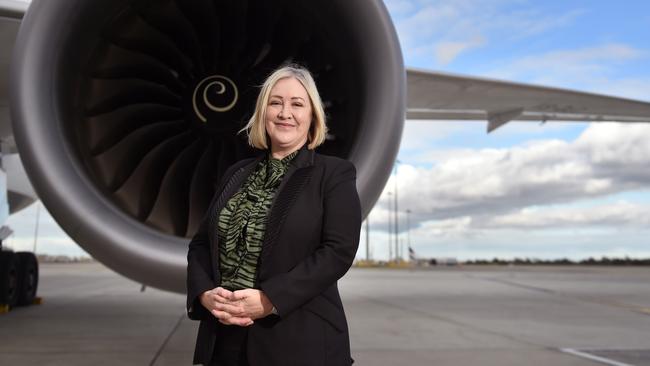
Travel agent Kylie Brumwell was preparing to put her son to bed last Wednesday when her phone rang. It was a client in Europe, seemingly stuck due to yet another airline cancellation.
From a standing start post-pandemic, airports and airlines across the world have been straining – and often failing – to manage their core business of shuttling people, bags and freight from one place to another.
“I’m up at 4am and working until 10pm,” said Ms Brumwell, an independent agent with Flight Centre’s Travel Partners unit.
“The big problem is that if there is an issue or a flight is cancelled, there is just no other way to get home – or out of the country in the first place – because the flights are so full and airlines are still rebuilding their capacity.”
So far this week, she’s had one customer stuck in Bergen, due to a cancelled flight, who needed to be in Oslo to make their long-haul flight home – the last available seat for a week – and another downgraded from business class to economy on a flight home from London.
“Flying can be extremely frustrating for travellers right now,” said Ms Brumwell, who managed to solve both customers’ problems and get them home on time and in the seat they had paid for.
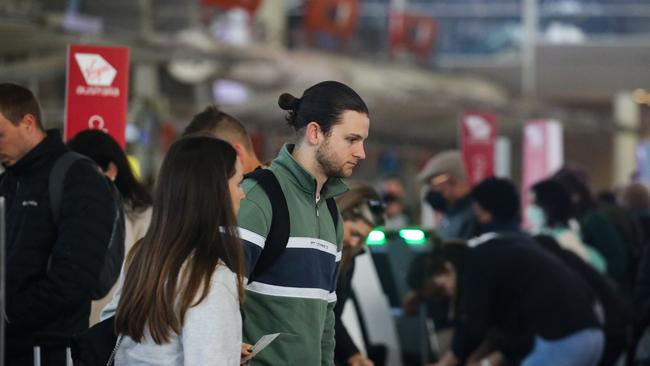
One of the world’s biggest airports, London’s Heathrow, this week took the extraordinary step of telling airlines not to book any new passengers on flights during the peak – and most profitable – holiday season because it did not have the manpower to handle their business.
The airport’s management also apologised for aircraft breaking a midnight movement curfew, for the bags piling up outside the terminal, and for the four-hour delay passengers face to pass through security. Delta had to fly a plane with no passengers from Heathrow to the US to reunite passengers with their bags.
London’s Gatwick has also limited daily flight numbers and Amsterdam’s Schiphol has curbed its maximum daily passenger numbers by 13,500 – just when people are trying to holiday for the European summer.
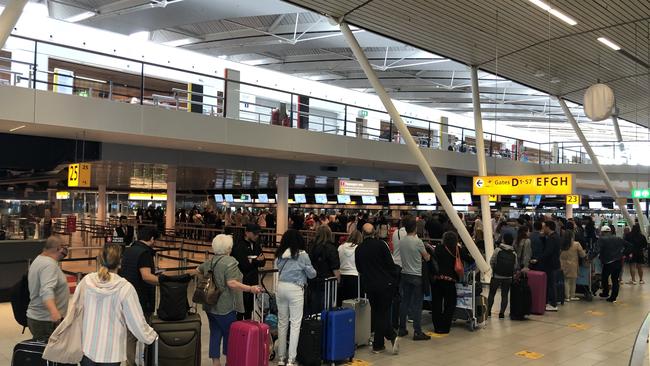
These facts certainly help keep the dramas and queues at airports across Australia in perspective.
“We went to rock bottom as an industry and the recovery is pleasing to see but challenging,” Brisbane Airport chief executive Gert-Jan de Graaff told The Australian.
“It feels like we are a start-up at the moment. Traffic has increased two and a half times from February. That would make any start-up quite jealous,” Mr de Graaff said.
Brisbane Airport avoided some of the shutdown, start-up chaos of other airports because its large mining fly-in fly-out operations continued during the Covid-19 pandemic.
But the overall picture in Australia has also not been pretty.
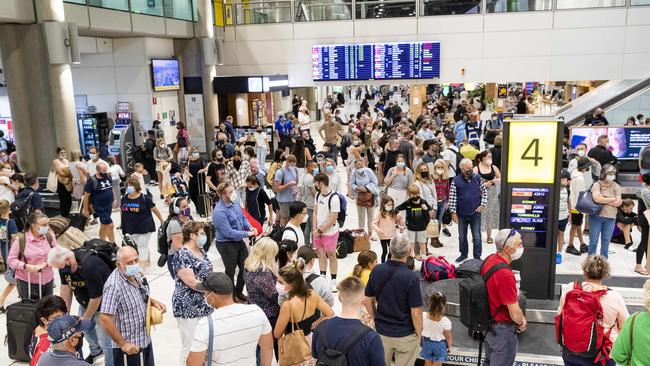
The nation’s major airlines are on track to record one of their worst on-time performances on record after more than half of all domestic flights last week were delayed or cancelled last week.
As The Australian revealed on Tuesday Qantas cancelled 6.7 per cent of domestic flights and had an on-time performance of 44 per cent last week. Virgin Australia cancelled 14.7 per cent of flights and had an on-time performance of 43 per cent for the same period.
Qantas’s chief executive of domestic and international, Andrew David, told The Weekend Australian that its on-time performance was “not good enough” but said the airline was improving, and that call centre wait times had improved to only a few minutes, after skyrocketing to as much as seven hours over the Easter period.
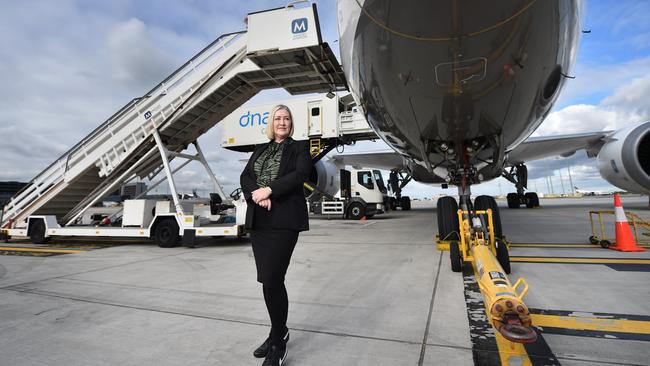
Qantas too was forced to fly a plane with no passengers during this time to reunite bags and their owners. Mr David said mishandled bag numbers had halved since the Easter break.
The airline outsourced its key baggage handling operations during the pandemic, a measure subsequently found by Federal Court to be illegal. Qantas has sought to have the matter heard by the High Court.
Mr David said that Qantas had avoided the issue of having passengers stranded overseas so far, but admitted the strain on the global network was showing because most airlines were now full and often overbooked.
“We do have high loads,” Mr David said. “It’s a real challenge because everyone’s planes are full, so it’s hard to recover if there is a problem. Typically, we would turn to our partners to help, but they don’t have the ability to do that at the moment.”
Qantas has been on a hiring frenzy since lock downs ended. During the Covid-19 pandemic, Qantas cut 9400 jobs and Virgin – which fell into bankruptcy – cut 3000 jobs. Both airlines have been racing to restaff as demand for travel has rebounded. Qantas has recruited 1000 people since Easter.
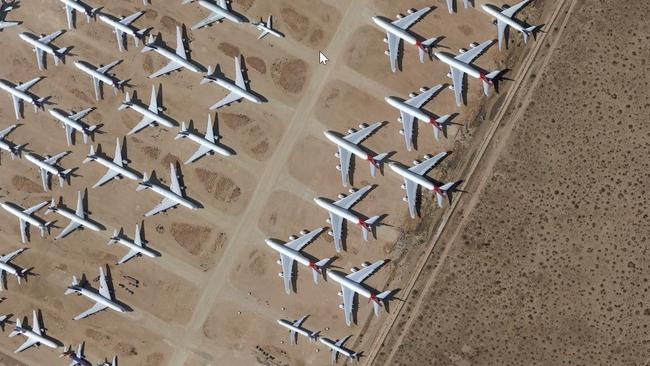
Qantas is also racing to bring its fleet back from the American desert as fast as it can.
The airline has three of ten Airbus A380s back in service, with three due back in operation by the end of the year. Two more are being refitted for next year, and two set to be retired.
“When they’ve been sitting in the desert for this long you need to check that everything is okay, but all that capacity will help address the demand we are seeing,” Mr David said.
On top of the A380s, Qantas has three new 787s due to be delivered by Boeing next year, although the aircraft builder has reported delays across their 787 deliveries.
Regional Express has also been expanding, having on Friday announced the purchase of fly-in fly-out operator Cobham.
Rex, in contrast to Qantas and Virgin, did not cut staff during the pandemic and instead increased its employees by 400 to total of 1,500 people.
“Logic tells you that if you believe you’re going to get back to 100 per cent you’re actually going to need those people,” said Rex deputy chairman John Sharp.
“Years ago, we used to use contractors for baggage handling. And we used to use contractors with catering but we decided to take it all in house and do it ourselves. And I have to say it’s a better outcome,” he added
The good news is that no major Australian airports believe the British and European airport-led capacity cuts will be necessary here.
“That’s definitely a decision for the airlines not us, and they have made capacity reductions across their networks,” said Melbourne Airport’s new chief executive Lorie Argus, who said in her 30 years in aviation she had not seen a situation like that of Heathrow at the moment.
Ms Argus said Covid-19 and the severe flu season was having an impact on travel, adding that in recent weeks one of the biggest factors causing havoc on travel had been the severe weather in Sydney, which was having knock-on impacts across the Australian airport network.
Last week, some 40 per cent of flights from Sydney were late inbound due to weather.
The good news, Ms Argus said, is that the airport is back at pre-pandemic capacity and queue times at security have been 20 to 30 minutes at the peak.
“It’s challenging but exciting,” Ms Argus said of the rebound in travel, adding Melbourne Airport did not sack security staff during the pandemic, citing the extended times required to train for the role.
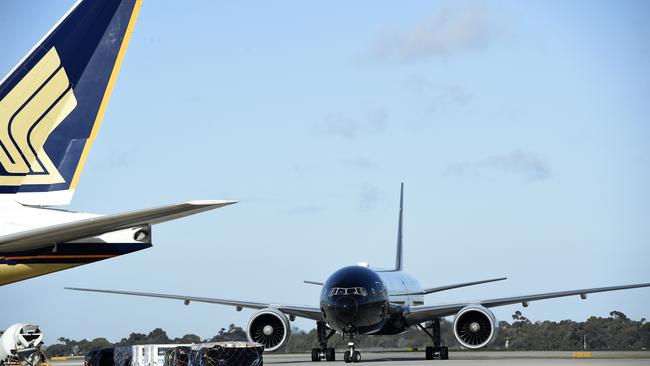
Sydney Airport suffered greater challenges during Easter, with passenger queues snaking outside the airport terminals for hours, and long queue over the winter school holiday period as well. The airport said in a statement that it had deployed an additional 60 customer service staff every day during the school holiday peak, specifically to manage queues and bring passengers forward in order of flight priority;
Sydney Airport also introduced a priority security screening lane, changed terminal signage to help guide passengers and assist with passenger flow, and introduced an additional domestic taxi drop off area.
For Ms Brumwell, the message is clear that now more than ever, as airlines and even airports cancel flights and change schedules, having a travel agent is important.
“People that don’t have a travel agent right now would be in a world of pain because they just wouldn’t know who to call or turn to when something like this happens,” Ms Brumwell said.
“We often have direct connections with major airlines, cruise lines and tour providers and are able to navigate challenging situations when it’s too hard to get through to them directly.”
As the Australian school holidays come to an end this weekend, many people will be glad to have made it home on time for the return of the school term.





